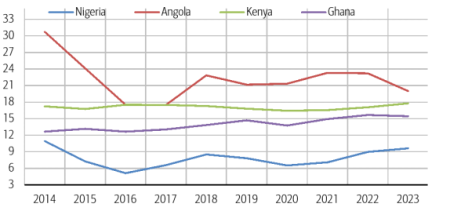
Singapore/London — The euro was heading on Friday for a record twelfth week of declines against the dollar, unless U.S. jobs data later in the day push the currently all-dominant greenback lower.
The European common currency was last down 0.16% at $1.0533, a touch above Tuesday’s 10-month low of $1.0448 but still set for a further weekly decline of 0.2% making that streak the longest since its launch in 1999.
The euro/dollar moves have largely been dollar-driven, and the dollar index, which tracks the unit against six main peers, albeit with the greatest weight given to the euro, is heading for a 12th straight week of gains.
The last time it clocked such a milestone was in 2014.
The dollar’s recent strength has been underpinned by a rapid sell-off in U.S. government bonds, which sent yields to multi-year highs.
That was driven by a combination of capitulation by asset managers who had been long on government bonds, rising oil prices, a deluge of supply of government and corporate bonds, and investors finally accepting that central banks will keep rates high for a long time, particularly in the United States where economic data has been strong.
Other currencies were able to catch a break in the middle of this week when bond prices steadied, but U.S. non-farm payrolls data (due at 1230 GMT Friday) could change that.
“The pause in the bond sell-off is granting some room for recovery for most currencies against the dollar. Today’s US payrolls are, however, the big event of the week and a strong read could easily put markets back on a bearish track and reignite aggressive dollar buying,” said Francesco Pesola, FX strategist at ING.
The pound, which hit a six-month low earlier in the week before rebounding, was down 0.18% at $1.2169, and the dollar was also up against the Japanese yen, 0.3% higher at 148.97.
Dollar/yen’s sharp sudden Tuesday dip to 147.30 stoked speculation that Japanese authorities could have intervened in the currency market to shore up the battered yen, though data from the Bank of Japan (BOJ) seemed to suggest otherwise.
“Whether the BOJ and/or (Ministry of Finance) will intervene at distinct levels … will continue to be a tease, contingent on broader currency markets and momentum,” said Vishnu Varathan, head of economics and strategy at Mizuho Bank.
Elsewhere, the Swiss franc was a touch weaker at 0.9130 per dollar though was set to finish the week slightly firmer, the only G10 currency other than the yen to be on track to finish the week stronger.
The Australian dollar was steady at $0.6364 but set for a 1% weekly decline.
*Rae Wee & Alun John; editing: Shri Navaratnam & Lincoln Feast – Reuters



